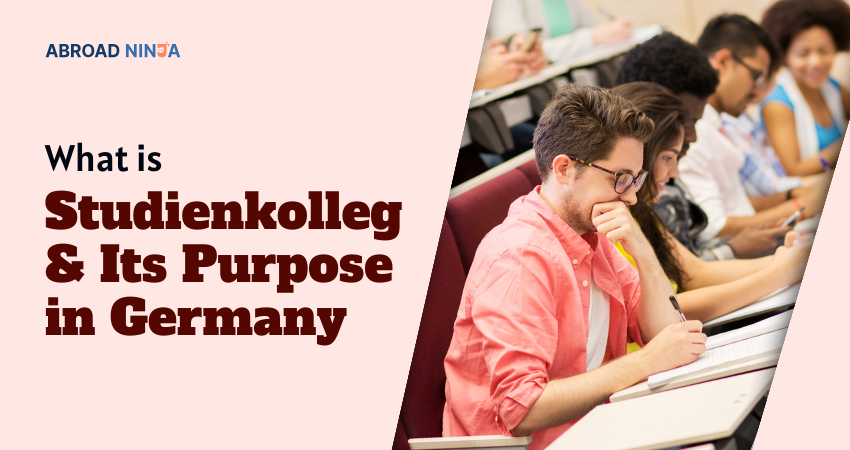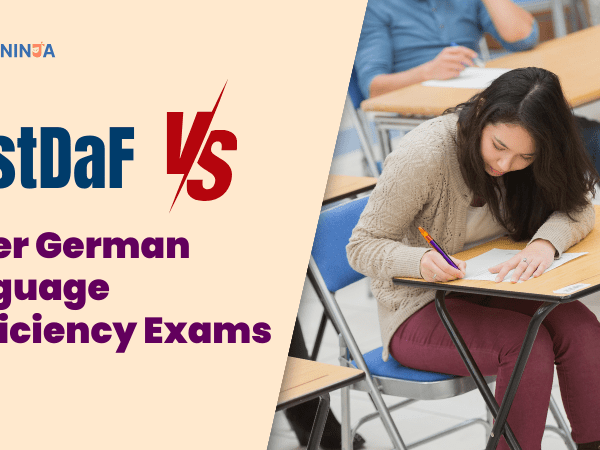To understand the introduction of this article about “What is Studienkolleg in Germany and Its Purpose”, delve into the definition of Studienkolleg in Germany and the importance of Studienkolleg for international students. These sub-sections provide a solution to grasp the purpose and significance of Studienkolleg for those seeking higher education in Germany.
What is Studienkolleg in Germany!
Definition of Studienkolleg
The term “Studienkolleg” refers to special educational institutions in Germany. They offer preparatory courses for international students who want to attend uni in Germany. The courses help students learn the language, and get the knowledge needed for university.
Studienkollegs are affiliated with universities or colleges. They offer four main types of courses: T-course (technical and natural sciences), W-course (business and economics), M-course (medicine and biosciences), and G-course (humanities and social sciences).
To attend a Studienkolleg, students need to have finished secondary school in their home country and have a good command of German. They may also need to pass an entrance exam or submit documents.
Attending a Studienkolleg helps international students adapt to the German education system. It also increases their chances of success at university. Graduates can continue their studies in Germany by directly enrolling in an undergraduate program.
Studienkollegs were set up in the 1960s to attract talented international students. They still play an important role in international education exchange today.
Importance of Studienkolleg for international students
Studienkolleg has great importance for international students. It helps them to access higher education in Germany. This preparatory program equips them with the essential German language and academic abilities needed to be successful in their chosen field. Without completing Studienkolleg, foreign students may find it hard to understand lectures, join discussions, and do assignments at German universities.
In addition, Studienkolleg offers a way for international students to experience the German culture and become familiar with the educational system of the country. Through connections with other students from various backgrounds, they can build intercultural proficiency and broaden their outlooks. Not only does this exposure help with their personal development, but it also prepares them to flourish in a multicultural setting which is sought after by employers globally.
A unique characteristic of Studienkolleg is its adapted curriculum specifically for international students. It concentrates on topics connected to their chosen field of study and teaches them the academic rigor expected at German universities. By providing an intensive one-year education program including language training, subject-specific courses, and examination preparation, Studienkolleg ensures that foreign students are well-prepared for the obstacles they will face during their academic journey.
An example of the importance of Studienkolleg for international students is the story of a Chinese engineering student. Initially, he had difficulty adjusting to the demanding academic requirements of a German university. However, after completing Studienkolleg, he polished his German language skills and learned the basics of mathematics and physics. He not only did very well academically, but he also became one of the top achievers in his group. His success story shows how Studienkolleg fills the gap between different educational systems and makes it easy for foreign students to integrate.
Studienkolleg in Germany: Programs and Structure
To understand Studienkolleg programs and their structure in Germany, delve into the description of Studienkolleg programs, entry requirements, and the application process, as well as the duration and structure of Studienkolleg courses. Each sub-section offers valuable insights into the purpose and functioning of Studienkolleg programs for international students in Germany.
Description of Studienkolleg programs in Germany
Studienkolleg programs in Germany give international students a way to enter German universities. These courses prepare them for the demands of studying in Germany. They cover topics such as math, physics, chemistry, biology, and German language and literature. The length of these programs ranges from one to two semesters, depending on the student’s educational background and field of study.
Not only do these programs provide subject-specific knowledge, but they also teach essential study skills and strategies that are needed for success in German universities. The curriculum is designed to bridge the difference between a student’s home country’s education system and German university requirements. This helps students fit in better to their degree programs without trouble.
One special aspect of Studienkolleg programs is that they are tailored to different academic backgrounds. There are courses for those wishing to pursue engineering or natural sciences, as well as options for those who are interested in social sciences or humanities. This diversity lets students focus on their areas of interest and build a strong base in their chosen field prior to beginning university studies.
It is important to note that finishing a Studienkolleg program does not guarantee entrance into a German university. However, it greatly increases the chances of acceptance by showing the student’s capability to meet the academic standards.
According to “DAAD – Deutscher Akademischer Austauschdienst,” more than 40,000 international students attend Studienkollegs each year in Germany. This shows the value and popularity of these programs among global students seeking higher education opportunities in Germany.
Entry requirements and application process
Getting into a Studienkolleg program? You’ll need to meet certain requirements and follow the application process. Here’s what you should know:
- A high school diploma or equivalent is usually needed.
- You may also need to prove language proficiency, through tests like TestDaF or DSH.
- Different Studienkollegs may have specific subject prerequisites. Check them before applying.
- You’ll need to submit an application form with documents like educational certificates, language test results, etc.
- After your application is accepted, you may have to take an entrance exam or interview.
Remember, each Studienkolleg may have their own unique requirements and procedures. Check their website or contact them for accurate information.
Pro Tip: Prepare for language tests early to meet the requirements on time.
Duration and structure of Studienkolleg courses
Studienkolleg courses are special programs for international students to get ready for university studies in Germany. To help you understand, take a look at the table below. It shows the duration and structure of the courses.
| Course Level | Duration | Structure |
|---|---|---|
| T-course | 1 year | Intensive language training + subject-specific academic coursework |
| W-course | 1 year | Intensive language training + mathematics, economics, and business courses |
| M-course | 1 year | Intensive language training + mathematics and science courses |
| G-course | 1 or 2 years | preparation for humanities and social sciences |
These courses have a particular focus and length. The curriculum consists of intensive language classes plus subject-specific courses. This helps students get the language skills and foundational knowledge needed to do well in their field.
Also, Studienkolleg programs give students the chance to interact with people from different backgrounds. This helps with cultural integration and personal growth.
Also Read: Study in Germany for Indian Students
Purpose and Benefits of Studienkolleg
To better understand the purpose and benefits of Studienkolleg, let’s explore how it helps you in your journey to study in Germany. Prepare for university studies, enhance language and academic skills, and smoothly adapt and integrate into a new culture. This section dives into these three facets of Studienkolleg, offering insight into its significance.
Preparation for university studies in Germany
Studienkolleg focuses on teaching students the academic curriculum they need for their degree. This includes maths, natural sciences, engineering, social sciences, and humanities. Studienkolleg also helps students learn German. It provides language training which improves students’ language skills. Additionally, it gives them a cultural experience in Germany. This helps students develop a global mindset that will benefit them.
To make the most of studienkolleg, students should ask for help, and work with others.
Improvement of language and academic skills
Are you looking for a way to improve your language skills and excel academically? Look no further than Studienkolleg!
It offers intensive language courses to help students enhance their proficiency in German or any other necessary language. These classes focus on developing reading, writing, listening, and speaking skills.
Moreover, Studienkolleg provides rigorous academic training to ready students for university-level studies. Subjects such as mathematics, physics, chemistry, and biology are covered. Students also learn about effective note-taking strategies, time management skills, and critical thinking methods.
This educational institution also promotes cultural integration among international students. Exposure to different cultures increases global awareness and creates an inclusive learning environment. In addition to language and academic training, internships and exchange programs are available to broaden students’ horizons while gaining practical experience.
Don’t miss out on this chance to transform your educational journey! Register now for the upcoming term at Studienkolleg and set yourself up for success.
Cultural adaptation and integration
Students can learn more about German customs, traditions and social norms. Cultural exchange allows for respect of different perspectives. When students are proficient in the German language, they can communicate better with locals. Cultural events give exposure to art, music and literature. Connecting with other students helps with social integration. Knowing etiquette helps with day-to-day life.
It is important for students to be involved with the local community. They can do this by volunteering or joining student associations. This way, they can further understand culture and build relationships.
Pro Tip: Be open to different cultures and be proactive in unique experiences. This will help you grow during your time at Studienkolleg and improve your academic and personal development.
Challenges and Tips for Studienkolleg
To overcome the challenges of Studienkolleg, equip yourself with effective strategies. For common challenges faced by international students and strategies for success in Studienkolleg, find solutions that will help you navigate this preparatory program smoothly.
Common challenges faced by international students
- Academic System: A new academic system can be tricky for international students. They have to get used to different course work and grading methods.
- Language Barriers: Language is important in education. International students may find it hard to comprehend lectures, join discussions, or finish assignments due to language issues.
- Cultural Differences: Adapting to another culture can be problematic. International students may struggle with social interactions, learning cultural norms, and fitting into the local community.
- Homesickness: Being away from home is tough emotionally for international students. They may feel lonely and miss their family and usual environments.
It’s essential for international students at Studienkolleg to take proactive steps. To do this, they can look for support from classmates, lecturers, or student services. Plus, joining clubs or taking part in after-school activities can help them make friends and feel at home.
Pro Tip: Building a strong support system is key to overcoming challenges for international students. Reach out for help when needed.
Strategies for success in Studienkolleg
Studienkolleg can be overwhelming. But with the right strategies, success is attainable! Here’s a 3-step guide to navigate Studienkolleg effectively:
- Build a base: Start by acquiring a strong understanding of the German language. Focus on reading, writing, listening and speaking. Take advantage of language courses and practice regularly to become fluent.
- Master the subjects: Studienkolleg covers various subjects such as maths, biology and physics, depending on your chosen field. Allot enough time to each subject and create a study plan accordingly. Use textbooks, online resources and seek help from tutors and classmates.
- Stay organised and motivated: With a hefty workload, organisation is key. Create a study plan with deadlines for assignments and exams. Break down complex topics into smaller parts for easier understanding. Set goals and reward yourself for completion.
Plus, forming study groups with fellow students provides valuable support and improves comprehension through collaborative learning.
Pro Tip: To ensure long-term success, revise previous topics regularly to reinforce understanding.
Also Read: Germany Student Visa Success Rate
Studienkolleg vs Other Preparation Programs
To understand the differences between Studienkolleg and other preparation programs, such as foundation programs and direct university entry, let’s explore their unique solutions. We’ll compare Studienkolleg with foundation programs and direct university entry to shed light on their distinct approaches to preparing students for higher education in Germany.
Comparison with foundation programs
Studienkolleg programs are like foundation programs. Here’s a comparison:
| Category | Studienkolleg | Other Foundation Programs |
|---|---|---|
| Structure | One-year course in Germany | Preparatory courses worldwide |
| Focus | For German universities | Tailored to country |
| Entry Requirements | German language proficiency | Language test specific to the country |
| Course Duration | Usually one year | Varies from 6 months to 2 years |
Studienkolleg provides unique opportunities for international students wanting to study in Germany.
Pro Tip: Do your research before deciding! Check the requirements of both Studienkolleg and other foundation programs.
Comparison with direct university entry
Studienkolleg is different from other preparation programs in terms of entry requirements, curriculum, and duration of study. The table below summarizes these variations:
| Studienkolleg | Other Preparation Programs | |
|---|---|---|
| Entry Requirements | German language skills and secondary education completion | Varies by program |
| Curriculum | Intense language and subject-specific classes | Focus on language and academic skills |
| Duration | Usually 1 year | Can take from a few months to 2 years |
Studienkolleg is great for international students who want to pursue higher education in Germany. Knowing the language and subject-specific knowledge are essential for university admission.
Pro Tip: Make sure to research carefully when choosing between Studienkolleg and other preparation programs. It’s important for achieving your academic goals.
Also Read: Germany Immigration Process from India
Conclusion
Studienkolleg is a must-have for international students wishing to study in Germany. It provides language training and educational preparation, ensuring they are ready for university. This bridge between educational systems helps them integrate into German higher education institutions. Studienkolleg focuses on language proficiency and subject-specific studies, which give students the skills they need to succeed.
Moreover, it offers a supportive environment for students to interact with peers from different backgrounds. This boosts cultural exchange and understanding, as well as personal growth – all of which prepares them for studying abroad. The rigorous curriculum at Studienkolleg not only strengthens academic competencies, but also hones critical thinking, problem-solving, and research abilities.
Studienkolleg has a long past, going back to post-WWII Germany seeking to become an educational and innovative hub. Thus, it was established to help foreign students adapt to the German education system. It is now an integral part of the country’s higher education framework.
Frequently Asked Questions
1: What is Studienkolleg?
A: Studienkolleg is a preparatory course for international students in Germany who want to study at a German university. It helps students meet the academic requirements and language proficiency needed for their chosen degree program.
2: What is the purpose of Studienkolleg?
A: The purpose of Studienkolleg is to provide international students with the necessary skills and knowledge to succeed in higher education in Germany. It equips students with the required German language proficiency and academic background for their chosen field of study.
3: Who needs to attend Studienkolleg?
A: International students who do not possess a direct qualification for university admission in Germany, either due to their educational background or language proficiency, are typically required to attend Studienkolleg.
4: How long does Studienkolleg last?
A: Studienkolleg usually lasts for one year, divided into two semesters. The duration can vary depending on the student’s chosen field of study and their individual progression.
5: What subjects are taught in Studienkolleg?
A: Studienkolleg offers various subject-specific courses based on the student’s intended field of study, such as Mathematics, Physics, Chemistry, Biology, Technology, Humanities, Social Sciences, and German language courses.
6: Does Studienkolleg guarantee admission to a German university?
A: Successfully completing Studienkolleg does not guarantee direct admission to a German university. However, it increases the chances of admission by fulfilling the academic and language requirements necessary for university entrance.




